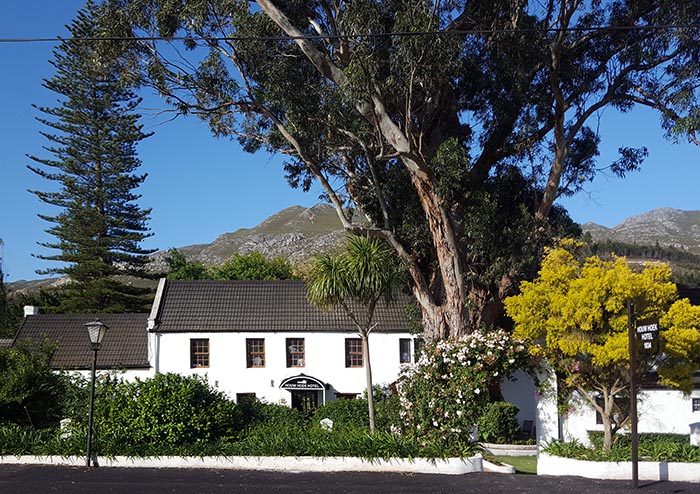Since 1779
– the oldest licensed hotel in south africa –The oldest licensed hotel in South Africa
The hotel at Houw Hoek was built in 1779 in the days of the Dutch East India company. Back then it was called the Houw Hoek Inn. It was originally the site of a toll gate on the wagon road to the eastern interior. A second floor was added in 1861.
The hotel was licensed in 1834 – it holds the oldest liquor license in South Africa – and has been in continuous operation for longer than any hotel in the country.
It has seen many expansions and improvements over the years and, in one form or another, the Houw Hoek Hotel has offered hospitality to travellers for more than two centuries.


The story of the giant bluegum tree
The massive bluegum tree that can be seen in front of the Houw Hoek Hotel might not be the tallest in the country, but it’s almost certainly one of the oldest.
In 1848 the proprietor of this hotel was a German former missionary, Johann Paul Beyers. He planted this bluegum tree to commemorate the birth of his fifth child, Maria Gertrude on 28 August 1850. The birth is said to have taken place in the room opposite this bluegum tree. Maria married a Scotsman, Walter McFarlane, who became co-owner of the Houw Hoek Hotel. Walter went on to build the Marine Hotel in Hermanus in 1902 and was also the first Mayor of Hermanus. The tree has a circumference of 11 m and is still expanding.
The tree still guards the entrance to the hotel.
What's in a name?
Over the years, the name has varied from Houthoek, Houhoek, Haue Hoek, Houhoeck and Houdhoek. Different explanations of its meaning have been offered.
Dr H Lichtenstein, a German traveller in 1804, explained that owing to the length and roughness of the pass, the animals needed a rest and the wagons had to be held, from there “Hou”, which means to hold.
G S Nienaber submitted that the Hessekwas farmed there, and “Hou(w)” is the Khoi word for cattle. Therefore, he says, Houwhoek means “cattle corner”.
According to Willem van Putten, deputy factor of the Dutch East India Company, the name refers to “ter houw komen” which means, to rest – after negotiating the slopes of the pass.
